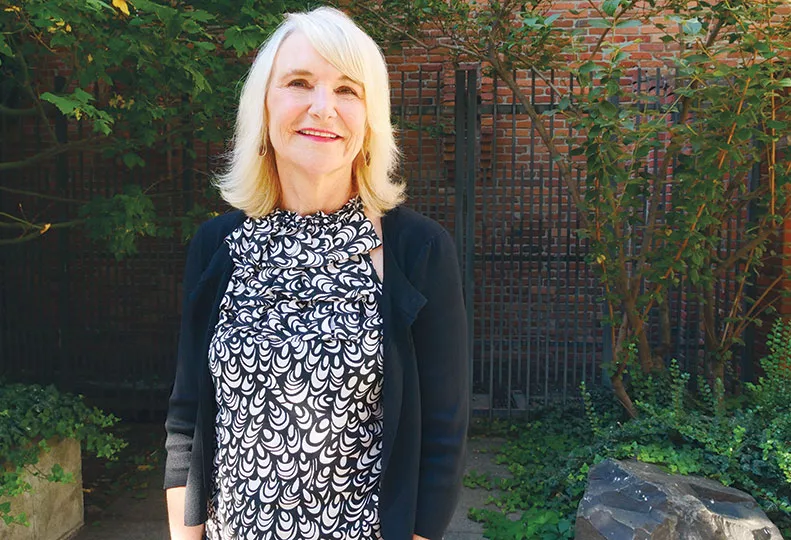Parting Thoughts with Visit Spokane's Meg Winchester
~

Meg Winchester, president and CEO of Visit Spokane, has announced her retirement effective Jan. 1.
Winchester joined Visit Spokane in 2019 after nearly 10 years of serving as the director of the Galveston Island Convention and Visitors Bureau, in Galveston, an island city on the Gulf Coast of Texas.
Growing up, Winchester moved around a lot, including living two years in Japan, courtesy of her father’s career as a jet pilot in the U.S. Navy. After graduating from Texas State University with a bachelor’s in journalism and communications, Winchester moved to Los Angeles, where she embarked on her hospitality career.
Her first job was as a receptionist at a Japanese hotel in downtown LA. Thereafter, she began to take on more roles and eventually moved to San Diego to work as a national sales manager for the San Diego Convention Center. After that, she moved to Houston, where she also worked in sales for Visit Houston for three years before moving to Galveston.
As president and CEO of Visit Spokane, Winchester oversees a team of 21 full-time employees and the organization’s operations and activities.
The Journal recently sat down with Winchester to discuss her career in hospitality and tourism, her experience during the COVID-19 pandemic, and what her plans are during retirement.
What brought you into the world of hospitality and tourism?
I fell into it. When I went to apply for the receptionist position at the Japanese hotel, I didn’t know what I wanted to do. I waitressed for years and had a bit of hospitality background. The hotel then said to me that they had an opening in the catering department and I said, “OK, why not?”
Back in the day when I was coming up, there weren’t hospitality schools and colleges, so there really was no formal training. I did catering for 13 years for different organizations then was asked to join the City Wide Sales Team in San Diego, and the rest is history.
You came here right before the pandemic. What was that like?
It was difficult. I moved up here by myself too, so it was different. I just did it on a leap and a faith and I don’t have one regret. I was here a year before COVID hit.
When COVID hit, because we are funded by hotel occupancy taxes and things like that, all our revenue basically stopped. So we had to take a deep look at our finances and make cuts. We laid off 19 people in one day. That was about the toughest day of my career.
Our finance director, Maureen Dodroe, was looking at forecasts every week to try to figure things out. We actually brought back one person right away because we needed one more just to keep the wheels on the bus. We were all doing a little bit of everything.
My job was just to legislatively look at what was going on funding-wise. We didn’t qualify for the first round of Payment Protection Program loans. But we were so fortunate that the county really understood the value of tourism and they gave us $2.5 million of CARES funding. The marketing team did a fantastic job with it, that was part of our Room to Roam campaign.
It was tough, because in a leadership role, I feel a strong responsibility for the organization but also for the team members.
Besides the pandemic, what have been some of the toughest moments of your career?
Funding and politics are probably the two hardest things in this industry. And politics is outside your control. Right or wrong, we were the second to last state to reopen for tourism. That was really difficult to work through.
Funding is always an issue. You can look across the country, and there are so many different funding mechanisms. Most of them come from some sort of levy on a hotel room via a tax or assessment. That is not always guaranteed so you are always looking.
The other thing is, I don’t think people really understand the value and economic impact of tourism.
Nice restaurants and stores are supported by tourism, because in most destinations, residents can’t support a restaurant full time. With the variety of restaurants we have in Spokane, it would be virtually impossible with the population we have. So the way they are able to stay open, in large part, is people coming in and visiting the destination.
What have been some of your biggest accomplishments in your career?
I love to mentor people and see people succeed in their career. Everybody asks, ‘what’s your why?’ My “why” is about the quality of life for the residents. Everything we are doing is creating a better quality of life for residents.
What advice would you give someone who wants to follow in your footsteps?
Probably my biggest advice is: Most people who I know are successful start at the bottom. They earned their craft on the way up.
I was an incredible late bloomer. I was well into my 40s before I started taking serious leadership roles. What I want to say to that is, don’t give up. If you have a desire for it, find a mentor. I have had some wonderful people that lifted me up through the years. Find the path that you want. Whatever you want to be, get your way there, learn as much as you can on the way up, and enjoy it. That’s the key, enjoy what you are doing.
This interview is edited for length and clarity.
Related Articles


_c.webp?t=1763626051)
_web.webp?t=1764835652)

